‘The power behind women leaders’: Inaugural SSWIMS fellows celebrate success
A fellowship for women in medicine and science supported projects that are improving education, research and patient care — and preparing participants for leadership.
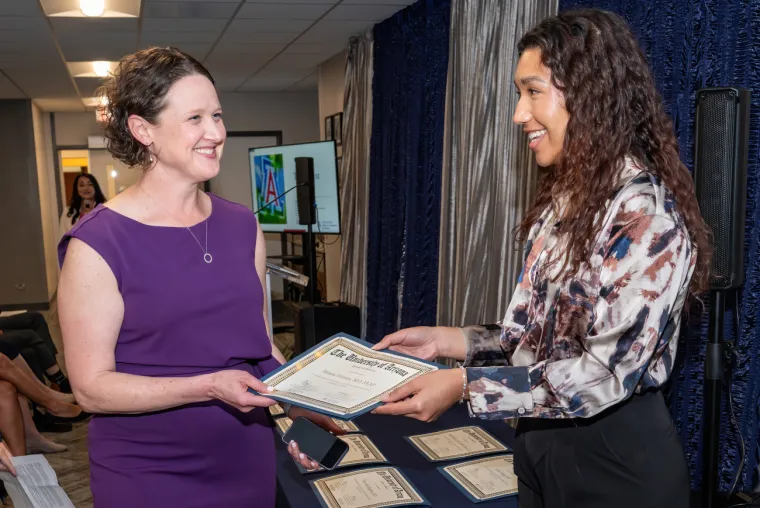
Dr. Helene Felman (left) was one of 12 inaugural SSWIMS fellows, all of whom conducted a yearlong research project on a topic aligned with their professional interests.
Mitchell Masilun

Hina Arif-Tiwari, MD, assistant dean of Women in Medicine and Science, introduces the inaugural SSWIMS fellows as they celebrate the completion of their projects.
Mitchell Masilun
After honing their research and leadership skills for a year, the inaugural cohort of the Spurring Success for Women in Medicine and Science (SSWIMS) Fellowship celebrated their achievements last month, sharing the results of the complex individual projects they designed and executed from start to finish. These projects weren’t just academic exercises — they are already having a direct impact on research, education and patient care at the College of Medicine – Tucson.
We spoke to four of the 12 fellows to get a taste for how SSWIMS is advancing the college’s mission. Inspired by their patients, Sujata Saha, MD, clinical assistant professor of surgery, and Helene Felman, MD, chief of the Division of General Pediatrics, are already delivering new modes of care to the community. Meanwhile, Allison Huff, DHEd, assistant professor of family and community medicine, and Salma Patel, MD, MPH, assistant professor of medicine, took huge steps to improve education across the college, at both the undergraduate and postgraduate levels.
Expanding patient care
Dr. Saha used her fellowship to expand treatment options for southern Arizonans with thyroid nodules, which can cause discomfort, difficulty swallowing or a choking sensation. For a long time, the standard of care has been a surgical procedure, but a noninvasive method was approved by the Food and Drug Administration in 2018.
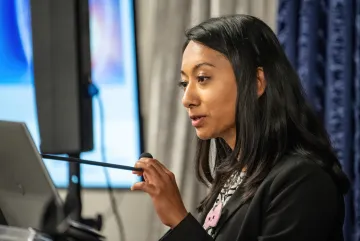
Before Dr. Sujata Saha brought radiofrequency ablation to Tucson, patients with thyroid nodules had to go to Phoenix for the procedure.
Mitchell Masilun
“Radiofrequency ablation waves cook the nodule from the inside. Over the next six months, that nodule shrinks down to almost nothing,” Dr. Saha explained. “They can avoid a scar and general anesthesia. I don’t have to rely on the operating room and get to cure patients right off the bat.”
Acquiring the necessary equipment took the entire year, but while she waited, Dr. Saha put other pieces in place, such as funding and training. She started seeing patients in June.
“I wanted to be the first to bring it to town,” Dr. Saha said. “Anything new or novel can be a boulder that you’re pushing up a hill. You have to be willing to push through the challenges of starting something new.”
Meanwhile, Dr. Felman initiated a study of Canvas Dx, an FDA-approved artificial intelligence-powered tool that can help diagnose autism by analyzing videos of the pediatric patient and questionnaires filled out by health care providers and caretakers. With funding from the statewide Medicaid program, she will assess its performance in Arizona’s unique patient population — and is already starting to enroll patients.
“One in 32 children is diagnosed with autism in the state, but there is a dearth of developmental pediatricians in Arizona, and the wait times are anywhere from nine to 12 months,” Dr. Felman said. “Our hope is to get kids diagnosed sooner, so they can get the therapies they need. The sooner they receive services, the better the outcomes.”
Dr. Felman hopes technology can help fill gaps created by this shortage in health care providers.
“We are being asked to do more with less all the time, so if we can optimize the tools we have to make the lives of our patients better, and make providers more efficient without burning out, we should take that opportunity,” Dr. Felman said. “I am new to academic medicine, so taking on a research project of this caliber and this magnitude is daunting. The support I’ve received through the fellowship provided ample guidance along the way.”
Taking education to the next level
Some SSWIMS fellows surveyed trainees and faculty members to identify gaps in the college’s educational offerings — and set out to improve the curriculum in response.
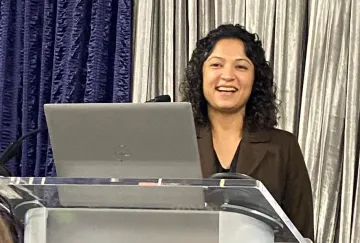
Dr. Salma Patel’s project will equip trainees to perform research inspired by their patients.
Sujata Saha
After learning that many medical residents didn’t feel prepared to spearhead original research, Dr. Patel is now guiding today’s trainees through the process.
“As a clinician at the bedside, questions will come up, and there might not be much information on PubMed,” Dr. Patel said. “It’s important for us to ask those questions and do the research study that will answer that question. It takes our medical practice to a whole different level.”
To give trainees the tools they need, Dr. Patel created a website with step-by-step instructions, videos, an explanation of terminology and concepts, links to relevant campus resources, and scholarship and funding information.
“They wanted five, six bullet points — how to get a project off the ground,” Dr. Patel said, adding that it’s already helping users navigate the research process. “I can’t wait to see where the students and trainees take their projects. It was a lot of work, but it’s been worth it when I see the impact it has had already.”
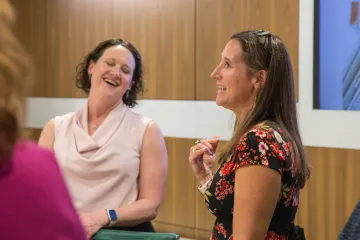
Dr. Allison Huff (right) says health care providers often learn interpersonal skills “through baptism by fire on the job,” and created a course to develop these competencies earlier.
Anna C. Christensen, College of Medicine - Tucson
The college also offers bachelor’s degrees that prepare graduates for a variety of health science professions. Dr. Huff identified areas where the undergraduate curriculum could be improved — and is preparing to launch a course within the Bachelor of Science in Medicine program in which students learn interpersonal and socio-emotional skills.
“The classroom focuses on technical skills, but the ability to connect and communicate with patients is really important. If they don’t have it, medicine and health care suffer,” Dr. Huff said. “It’s a very interactive course, with team-based learning, decision making and roleplaying.”
Dr. Huff says the course is in the approval process, and she hopes its first students will be able to enroll in the spring.
“I’m very excited for the course to get approved and be on the books,” Dr. Huff said. “A lot of faculty feel very passionate about it.”
Making leadership more representative
Programs like SSWIMS are supported by the college’s Women in Medicine and Science (WIMS) Program, which aims to increase the representation of women in academic leadership.
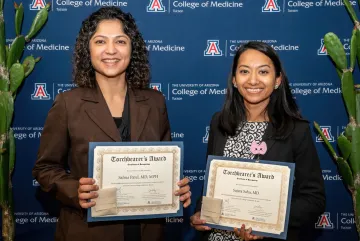
Dr. Salma Patel (left) and Dr. Sujata Saha (right)
Mitchell Masilun
“Sixty percent of medical student applicants are women, but that has not translated to leadership,” Dr. Saha said.
“At most colleges of medicine, women are a small fraction of leadership, and a smaller fraction are women of color,” Dr. Patel added. “We need to stand up and change those statistics, because our leadership needs to reflect our population.”
The four fellows unanimously agreed that SSWIMS helped prepare them for future leadership opportunities. Dr. Saha recently was promoted to clerkship director for general surgery, which she credits in part to the skills SSWIMS helped her hone.
“For someone so early in my career, this is a wonderful achievement,” Dr. Saha said. “This program catapulted me to realizing leadership positions were within my grasp, and I can shape my career to attain those goals.”
“The SSWIMS program was absolutely phenomenal. I sat with some amazing, intelligent, powerful women,” Dr. Huff said. “We can see the power behind women leaders. The amazing skills and attitude they bring to their leadership roles should be cultivated.”
The inaugural SSWIMS fellows are Anna Alkozei, PhD, clinical assistant professor of family and community medicine, Holly Bullock, MD, MPH, associate professor of obstetrics and gynecology, Helene Felman, MD, chief of the Division of General Pediatrics and clinical associate professor of pediatrics, Allison Huff, DHEd, assistant professor of family and community medicine, Olivia Hung, MD, PhD, clinical associate professor of medicine, Anna Landau, MD, MPH, DTM&H, clinical assistant professor of family and community medicine, Truc-Anh Nguyen, MD, clinical assistant professor of anesthesiology, Salma Patel, MD, MPH, assistant professor of medicine, Sujata Saha, MD, clinical assistant professor of surgery, Stephanie Schock, MD, former assistant professor of anesthesiology, Lora Wang, MD, associate professor of radiation oncology, and Stephanie Worrell, MD, FACS, chief of the Section of Thoracic Surgery and clinical associate professor of surgery.

